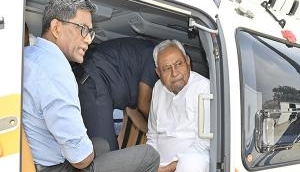Uniform Civil Code: forced majoritarianism or voluntary reform?

The issue
- The Constitution says the State shall endeavour to give citizens a Uniform Civil Code
- There are over 20 different personal laws currently in operation
- The Supreme Court has taken it upon itself to end the confusion over personal laws
The debate
- Proponents of a UCC say a homogenous law will lead to true secularism
- Opponents have a suspicion of majoritarianism, since the RSS lists it as one of its goals
More in the story
- Did Nehru and Ambedkar actually give us a UCC in disguise?
- Why women\'s rights groups have stopped demanding it
After years of nudging the executive and the legislature to take a call on a Uniform Civil Code (UCC), the Supreme Court decided to take the task upon itself.
On 12 October, the apex court gave the Union government three weeks to come up with a proposal to amend the Christian divorce act. The SC also asked the government to take a quick decision on a UCC, to end the confusion over personal laws.
Nearly a fortnight later, on 28 October, the apex court took suo motu cognisance of alleged discrimination faced by women under Muslim Personal Law. The court ordered that matter be treated as a PIL, and asked the Chief Justice of India to constitute an appropriate bench to look into the issue of gender discrimination under Muslim Personal Law.
Read- #UCCDebate: why Muslim feminists feel Islam can counter arbitrary divorce
A call to review the exploitative aspects of personal laws is welcome, but a uniform code is a sticky issue. Long resisted by various voices among the minorities in India, it involves examining a whole range of issues like plurality of cultures, secularisation of law, fears of a majoritarian agenda etc.
Catch is beginning a series of conversations on the UCC. The endeavour is to let both sides of the debate make cogent points on the topic.
Here's a quick run-down on what's at stake.
What is Uniform Civil Code?
Article 44 in Part 4 of the Constitution of India says that the State shall endeavour to secure for the citizens a uniform civil code throughout the territory of India. The code itself is not defined in the Constitution.
The Constitution says that the State shall endeavour to secure a Uniform Civil Code throughout India
It is generally considered to be an instrument that will serve to replace the many personal laws in India that are based on the scriptures and customs of various communities. These laws are largely related to marriage, divorce, inheritance, adoption and maintenance.
The UCC proposes that there will a common set of laws on these subjects for all citizens, irrespective of their religion and local customs.
How many personal laws are there in India?
Over 20. These include pre-Independence laws that survive even today. These are:
- The Converts' Marriage Dissolution Act, 1866
The Indian Divorce Act, 1869
The Indian Christian Marriage Act, 1872
The Kazis Act, 1880
The Anand Marriage Act, 1909
The Indian Succession Act, 1925
The Child Marriage Restraint Act, 1929
The Parsi Marriage and Divorce Act, 1936
The Dissolution of Muslim Marriage Act, 1939
The Special Marriage Act, 1954
The Hindu Marriage Act, 1955
The Foreign Marriage Act, 1969
The Muslim Women (Protection of Rights on Divorce) Act, 1986
The Indian Divorce (Amendment) Act, 2001
The Marriage Laws (Amendment) Act, 2001
The Parsi Marriage and Divorce (Amendment) Act, 1988
The Hindu Adoption and Maintenance Act, 1956
The Guardians and Wards Act, 1890
The Hindu Minority and Guardianship Act, 1956
The Indian Succession (Amendment) Act, 1991
The Indian Succession (Amendment) Act, 2002
The Hindu Succession Act, 1956
Then there are other communities and tribes that follow their own customs, like the matrilineal system of inheritance and succession followed in Kerala, Karnataka, Lakshadweep and by many tribes of Meghalaya.
Who are the proponents of UCC?
Proponents of a UCC advocate homogenisation of all these laws under one stream that will be applicable to all citizens, irrespective of their faith and customs.
According to historian Ramchandra Guha, the first Prime Minister of India, Jawaharlal Nehru, and the first Law Minister, Dr BR Ambedkar, "were both committed, in theory, to a Uniform Civil Code", since they wanted to "reform archaic personal laws and bring them in line with progressive notions of gender justice".
Watch- Why we fight: 5 Muslim women tell their story
However, Guha adds, they faced "bitter opposition of Muslim members in the Constituent Assembly" and decided to begin with the "reform of the personal laws of the Hindus".
Women's rights groups used to say personal laws are discriminatory and exploitative towards women, and therefore must be reformed by bringing a UCC.
For example, the provisions of polygamy and arbitrary divorce, as said to be allowed in Islamic law, have attracted widespread condemnation and calls for abolishing.
However, women's groups are now wary of a UCC, and instead, call for laws that ensure gender justice.
Part of the problem is that the proponents of UCC also include the Hindu right, whose leaders make the code sound like something that will subsume minority practices to a Hindu way of life. They do not frame it as an issue of human rights or gender justice that all communities must bow to.
Interestingly, this is a rare issue on which the right and the left are on the same page. Some Left-liberals also say religion has no place in law, and that a UCC will ensure eventual secularisation of law in India.
What are the hurdles?
In recent history, the debate has attracted majoritarian suspicions, as the Sangh Parivar lists UCC as a cherished goal that will not allow minorities to retain practices as per their faiths.
They will, instead, have to abide by one common law across the country, which Hindus already abide by.
Opponents of the UCC say they are entitled to have family laws or personal laws based on their faith and customs. They say any attempt to prohibit them from doing so would amount to violation of their rights guarantee, under Article 25 of the Constitution.
The multiplicity of personal laws and customs is a big challenge. If they are to be homogenised, which will be taken forward and which left out? How will the "normative" be arrived at?
The multiplicity of personal laws and customs is a big challenge. Under UCC, which will be left out?
There are progressive features in many personal laws that are lacking in others. Will all communities see these as progressive and abide? Even reformation of the Hindu personal laws is an unfinished task.
For example, the Hindu Minority and Guardianship Act, 1956, upholds the superior right of a father as the natural guardian for both boys and unmarried girls. The prior right of the mother is recognised only for the custody of children below five.
Also read-Taking the Sharia to court: 2 Muslim women you should know about
However, Muslim law recognises the absolute right of a mother to the custody of her minor children (Hizanat). Even the father cannot deprive her of it.
Many personal laws have progressive features. Will all communities recognise this and abide?
One Shia law, in case of girls, upholds the mother's right till the girl reaches the age of seven.
The Hanafi school, a Sunni Islamic school of jurisprudence, upholds the mother's right till the girl attains puberty.
Will Hindus adopt these? How will these many laws be homogenised?
The Uniform Civil Code needs lot of consultation. So far, the participants in this discussion have been organisations representing the Hindu right, like the Vishwa Hindu Parishad, as well as organisations with dubious claims of representing all Muslims, like the All India Muslim Personal Law Board.
The Board is often misunderstood as a government body that will oversee implementation of Muslim personal law; it is, in fact, only an NGO.
There have been calls to include many other stakeholders in consultations over a UCC, and either exclude or limit the involvement of such organisations.
How about an optional UCC?
That could be a great idea. It will allow all communities the option between adopting a law guided by their faith and customs, or one guided by the modern concerns of equality and justice. It might even lead to a gradual transition to secular law.
Some argue that such an optional code already exists in the country. Former Union minister and senior Congress leader Mani Shankar Aiyar argues that the Special Marriage Act, 1954, read with the Indian Succession Act, 1925, constitutes a voluntary Uniform Civil Code that India enacted six decades ago.
Yet, Aiyar adds, a large number of Hindus "prefer to get married under the Hindu code and regulate their personal lives in terms of Hindu Personal Law, embodied in a series of four laws enacted in 1955 and 1956 - that is, well after the voluntary Uniform Civil Code was bestowed on the country."
However, some more aspects of personal law, like adoption and maintenance, are still beyond the purview of an optional UCC.
Read more on Catch:
Ram Jethmalani: Modi and his ministers should resign after this judicial slap
Storm warming: the economic bad-winds awaiting the govt
Delhi is not safe. But it's getting a super-progressive women's rights charter
First published: 4 November 2015, 4:59 IST





![BJP's Kapil Mishra recreates Shankar Mahadevan’s ‘Breathless’ song to highlight Delhi pollution [WATCH] BJP's Kapil Mishra recreates Shankar Mahadevan’s ‘Breathless’ song to highlight Delhi pollution [WATCH]](https://images.catchnews.com/upload/2022/11/03/kapil-mishra_240884_300x172.png)

![Anupam Kher shares pictures of his toned body on 67th birthday [MUST SEE] Anupam Kher shares pictures of his toned body on 67th birthday [MUST SEE]](https://images.catchnews.com/upload/2022/03/07/Anupam_kher_231145_300x172.jpg)






